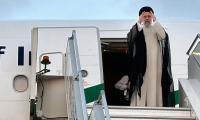SRINAGAR: India’s prime minister held a crucial meeting with pro-India politicians from Indian Illegally Occupied Jammu and Kashmir (IIOJ&K) on Thursday for the first time since New Delhi stripped the region’s semi-autonomy and jailed many of them in a crackdown.
No major decision was announced after the meeting and many Kashmiri leaders said they reiterated their demand that New Delhi should reverse its 2019 changes. It is important to note that only the puppet pro-India Kashmiri leaders were invited to the meeting, while the pro-freedom and genuine leaders were ignored. But the reply to the Indian government was the same – i.e. restoration of the special status.
Experts say the meeting was meant to ward off mounting criticism at home and abroad after Prime Minister Narendra Modi’s Hindu nationalist government in August 2019 downgraded the region’s status, split it into two federal territories — Ladakh and Jammu-Kashmir — and removed inherited protections on land and jobs for the local population.
Since then, Indian authorities have imposed a slew of administrative changes through new disputed laws, often drafted by bureaucrats, that triggered resentment and anger as many likened the moves to the beginning of settler colonialism. According to international media reports, Modi chaired the meeting in New Delhi attended by the Himalayan region’s 14 political leaders, including Modi’s own party members. India’s powerful home minister, Amit Shah, and New Delhi’s administrator in the region, Manoj Sinha, also attended the meeting.
Among those invited were IIOJ&K’s former three top elected officials: Farooq Abdullah, his son Omar Abdullah, and Mehbooba Mufti.Despite being pro-India and seen by many in IIOJ&K as New Delhi’s collaborators, Shah last year labelled them a “gang” while some others called them “anti-national elements.” Some senior ruling party leaders also dubbed them political untouchables who were rendered redundant by the 2019 decision. The three and a few other invited leaders were among thousands arrested and held for months in 2019. They have criticised India’s policies in Kashmir and formed an alliance with four other parties to fight them, calling them “spitefully short-sighted and unconstitutional.”
The alliance spokesman, Yousuf Tarigami, told reporters after the meeting that they did not get any concrete assurances from Modi and Shah, although they “heard our concerns, demands and aspirations.”
“India’s unconstitutional, illegal and immoral changes in the region are not acceptable to us,” Mufti, the region’s former chief minister, told reporters after the meeting.
Mufti said she told the Indian leaders that New Delhi should also talk to Pakistan and find a solution to the dispute. Modi said after the meeting that delimitation has to happen at quick pace so that polls can happen.
Talking to reporters after the meeting, Congress leader Ghulam Nabi Azad said five demands –– granting of statehood, conducting Assembly elections to restore democracy, rehabilitation of Kashmiri Pandits, release of all political detainees and that on domicile rules –– were put forward during their talks with the PM.
Ahead of the meeting, Jammu and Kashmir Congress President Ghulam Ahmad Mir said they would raise the issue of statehood at the all-party meet convened by Prime Minister Narendra Modi. “People in the state are shocked after the developments in 2019. We’ll wait for Prime Minister Narendra Modi’s agenda for meeting and respond accordingly,” he said.
Sushant Singh, a senior fellow at the Centre for Policy Research, a public policy think tank in India, said geopolitical reasons forced “Modi’s hand for an outreach towards Kashmiri political leaders.” In a tweet, he said Tuesday that the UAE-brokered backchannel talks led to “certain commitments from the Modi government on Kashmir.”
International pressure, particularly from US President Joe Biden’s administration, has also been piling on the Indian government to reverse some of its recent changes. Dean Thompson, acting assistant secretary of state for South and Central Asia, told a congressional hearing early this month that although New Delhi had taken some steps such as the release of prisoners and the restoration of 4G internet access in the region, “there are other electoral steps we’d like to see them take and that we have encouraged them to do and will continue to do so.”
Awami Muslim League chief appeared in the court with his lawyers Sardar Raziq and Sardar Shehbaz
Board meeting also allowed increase in business center and commercial area of hotel plots from 5 to 10 percent along...
Foreign exchange reserves currently stand at $8 billion, while Pakistan would also receive $1.1 billion IMF tranche:...
CM directed that the enforcement authorities be made functional in six months, and legislation in this regard be...
Pakistani soldiers and policemen stand guard outside the Haripur central jail. — AFP/FileWASHINGTON: The Pakistani...
Establishment Division has also issued an NoC to fill 465 civilian posts in the Ministry of Defence and 11 posts in...







